Simon Guerrier's Blog, page 25
April 28, 2023
Doctor Who Magazine #590
 The new issue of Doctor Who Magazine features my interview with Devante Fleming, one of the floor runners currently working on Doctor Who. There's also an infographic by me and illustrated by Ben Morris showing the winners of the reader poll for best Third and Fourth Doctor stories.
The new issue of Doctor Who Magazine features my interview with Devante Fleming, one of the floor runners currently working on Doctor Who. There's also an infographic by me and illustrated by Ben Morris showing the winners of the reader poll for best Third and Fourth Doctor stories.Stuart Manning has also written a feature on the first and very different draft script of fan-favourite The Ark in Space, which is being released on audio in June - produced by me. It includes an interview with Jonathan Morris, who adapted the script to work in your ears.
Robert Brown has also interviewed former BBC publicist Jacqui Stonebridge about the early days of Doctor Who - a nice surprise for me as I've seen Jacqui's name on lots of old paperwork recently. And I'm dead envious of my mate Mark Wright getting to interview Dave Gibbons.
April 18, 2023
David Whitaker at 95
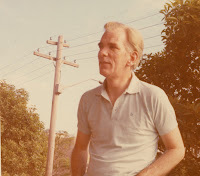 David Whitaker
David Whitakerin Australia, early 1970sOn 18 April 1928, 95 years ago today, David Arthur Whitaker was born in Knebworth.
In 1963, David became the first story editor of the new science-fiction series Doctor Who, and oversaw of 53 consecutive episodes.
(Two of those weren't broadcast: the unbroadcast pilot was rewritten and re-rerecorded as the broadcast An Unearthly Child, and the two episodes Crisis and The Urge to Live were, after they'd been recorded, edited down into a single episode. I'm not counting the re-recording of The Dead Planet in this total because, so far as we know, the production team worked from the same script so it didn't need David's attention.)
(Also, David didn't receive credit on The Edge of Destruction or The Brink of Disaster because he was the credited writer on those. There's no story editor credited on The Powerful Enemy or Desperate Measures, either, and he may well have written these while still employed as story editor. But paperwork suggested his editorial duties concluded with the episode before that, Flashpoint, so that's where I'm stopping this count. Phew.)
David is also the credited writer on 40 episodes of Doctor Who - more than anyone else in the 1960s, the fourth most prolific TV writer of old-skool Doctor Who (after Robert Holmes on 64, Terry Nation on 56 and Malcolm Hulke on 45 if we count his co-written episodes as 0.5).
Of the 97 missing episodes of Doctor Who, David Whitaker was the credited writer on 18. (John Lucarotti was credited on 11, some co-written, Brian Hayles on 9, Ian Stuart Black on 8.)
David also wrote two of the first three Doctor Who novelisations, co-wrote two of the first three Dalek annuals, co-wrote the first Doctor Who related stage play, polished one of the two Dr. Who movies and probably wrote the bulk of the long running Daleks comic strip.
It's the 60th anniversary of Doctor Who this year, so where was David Whitaker on this day in 1963, his 35th birthday? Well, he was in (or just about to go to) New York in an effort to sell a musical he'd written, Model Girl, with composer George Posford.
 Excerpt of letter from David Whitaker
Excerpt of letter from David Whitakerto June Barry, 30 April 1963
Going round the various showbiz houses to schlep his play, he was introduced as, "David Whitaker who drinks sherry."
He returned to the UK around 14 May, presenting his fiancee June Barry with an antique phone, a gift for the flat they were in the process of agreeing to rent after their forthcoming wedding on 8 June.
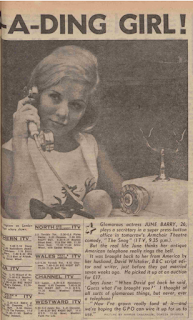 June Barry in the
June Barry in theDaily Mirror, 3 August 1963
Yes, that's the same top (and same flat) as seen in a 1965 photo shoot of June and David conducted for TV World - the Birmingham-region version of TV Times.
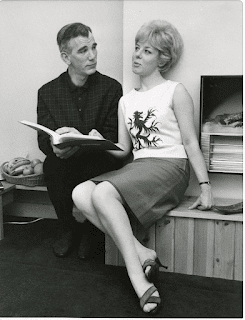 David Whitaker and June Barry
David Whitaker and June Barryat home, c. May 1965
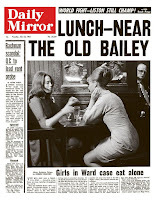 Daily Mirror, 3 July 1963(Doreen Spooner, the Daily Mirror's 'camera girl', who took the photo of June with the phone, had the previous month made front-page news with this extraordinary scoop, sneakily shot from the door of a pub toilet.)
Daily Mirror, 3 July 1963(Doreen Spooner, the Daily Mirror's 'camera girl', who took the photo of June with the phone, had the previous month made front-page news with this extraordinary scoop, sneakily shot from the door of a pub toilet.)David died in 1980 aged just 51. He was still working on Doctor Who. This form recently came to light, proof (at last!) that he'd been working on a novelisation of his 1967 TV serial The Evil of the Daleks.
I wrote a book about The Evil of the Daleks. Later this year, I've got a book out about another of David's Doctor Who stories, The Edge of Destruction.
You can learn more about David Whitaker in the documentary I worked on with splendid Chris Chapman and Toby Hadoke, on the Season 2 box-set released last year.
And I'm currently writing a ginormous biography, David Whitaker in an Exciting Adventure with Television, to be published by Ten Acre Films later this year. I'll end with this lovely note from David to a young Doctor Who fan in 1964...
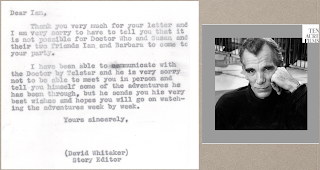 Letter from David Whitaker
Letter from David Whitakerto Doctor Who fan Ian
April 11, 2023
Masquerade: The Lives of No��l Coward, by Oliver Soden
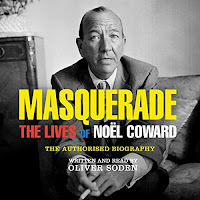 This remarkable, detailed and insightful biography is a great joy, and in the audiobook version you get the author's impressions of various famous people. The result has been excellent company on a couple of long drives, often making me and other passengers hoot.
This remarkable, detailed and insightful biography is a great joy, and in the audiobook version you get the author's impressions of various famous people. The result has been excellent company on a couple of long drives, often making me and other passengers hoot.Coward would surely have approved the deft mix of comedy and bathos, and perhaps the stylistic flourishes, too. Some bits are related in script form (Soden's own invention, based on documented sources), and there's a final sequence in which Soden vies with (and rolls his eyes at) Coward's other biographers.
I'm especially impressed by the honesty when historical sources are clearly suggestive but we can't know for sure what went on, such as with Coward's early (sexual?) relationships with men. But what really makes this work is the clarity Soden brings. He unpicks the complexities of a whole bunch of different people who often masked their true selves. And he's good on the impact and response to events - whether that's a review, a break-up, a change in legislation. I'm particularly impressed by how vividly he conveys the war: the horror of the Blitz, the work Coward was given (and not given to do), and how that appeared to those not in the know.
Soden briefly covers the moment when, while shooting In Which We Serve (1942), Coward dressed down an actor for arriving late on set, and fired him in front of the whole crew. The story of William Hartnell's tongue-lashing by No��l Coward is also recounted by the film's assistant director Norman Spencer, who says that the role was quickly filled by assistant director Michael Anderson. Spencer expresses shock at Coward's behaviour, and I wonder how Anderson felt about what happened. He later cast Hartnell in Will Any Gentleman? (1953) -- alongside another future Doctor Who, Jon Pertwee -- and I wonder if that was partly from guilt.
(On 25 November 2009, when we recorded my Doctor Who audio story The Guardian of the Solar System, the two actors were required to read in lines as Hartnell's Doctor. Jean Marsh, who had of course worked with Hartnell, advised Niall McGregor to play him as No��l Coward. Which was more helpful than my recommendation to play him as Professor Yaffle from Bagpuss.)
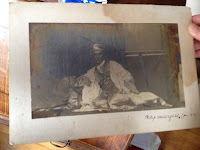 Philip StreatfeildI should also declare a small interest. Soden contacted me in 2021 about a family connection: my grandmother was the niece of Coward's (probably more than) friend Philip Streatfeild. Sadly, the original, faded photograph of Streatfeild I once found among some old family papers seems to have been mislaid; it was in a terrible state when I unearthed it. But I was able to share what my late father told me, and the result is a footnote in the book that would have delighted him - and has really pleased my mum.
Philip StreatfeildI should also declare a small interest. Soden contacted me in 2021 about a family connection: my grandmother was the niece of Coward's (probably more than) friend Philip Streatfeild. Sadly, the original, faded photograph of Streatfeild I once found among some old family papers seems to have been mislaid; it was in a terrible state when I unearthed it. But I was able to share what my late father told me, and the result is a footnote in the book that would have delighted him - and has really pleased my mum.
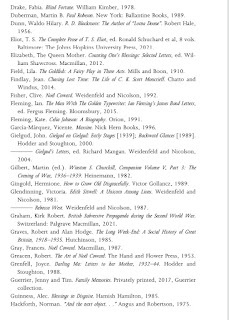 From the index of Masquerade
From the index of Masqueradeby Oliver Soden
Soden, in turn, sent me a link to a page about Philip Streatfeild on the Dulwich College website, which includes a poignant letter written by my great-great-grandfather.
Masquerade: The Lives of Noël Coward, by Oliver Soden
 This remarkable, detailed and insightful biography is a great joy, and in the audiobook version you get the author's impressions of various famous people. The result has been excellent company on a couple of long drives, often making me and other passengers hoot.
This remarkable, detailed and insightful biography is a great joy, and in the audiobook version you get the author's impressions of various famous people. The result has been excellent company on a couple of long drives, often making me and other passengers hoot.Coward would surely have approved the deft mix of comedy and bathos, and perhaps the stylistic flourishes, too. Some bits are related in script form (Soden's own invention, based on documented sources), and there's a final sequence in which Soden vies with (and rolls his eyes at) Coward's other biographers.
I'm especially impressed by the honesty when historical sources are clearly suggestive but we can't know for sure what went on, such as with Coward's early (sexual?) relationships with men. But what really makes this work is the clarity Soden brings. He unpicks the complexities of a whole bunch of different people who often masked their true selves. And he's good on the impact and response to events - whether that's a review, a break-up, a change in legislation. I'm particularly impressed by how vividly he conveys the war: the horror of the Blitz, the work Coward was given (and not given to do), and how that appeared to those not in the know.
Soden briefly covers the moment when, while shooting In Which We Serve (1942), Coward dressed down an actor for arriving late on set, and fired him in front of the whole crew. The story of William Hartnell's tongue-lashing by Noël Coward is also recounted by the film's assistant director Norman Spencer, who says that the role was quickly filled by assistant director Michael Anderson. Spencer expresses shock at Coward's behaviour, and I wonder how Anderson felt about what happened. He later cast Hartnell in Will Any Gentleman? (1953) -- alongside another future Doctor Who, Jon Pertwee -- and I wonder if that was partly from guilt.
(On 25 November 2009, when we recorded my Doctor Who audio story The Guardian of the Solar System, the two actors were required to read in lines as Hartnell's Doctor. Jean Marsh, who had of course worked with Hartnell, advised Niall McGregor to play him as Noël Coward. Which was more helpful than my recommendation to play him as Professor Yaffle from Bagpuss.)
 Philip StreatfeildI should also declare a small interest. Soden contacted me in 2021 about a family connection: my grandmother was the niece of Coward's (probably more than) friend Philip Streatfeild. Sadly, the original, faded photograph of Streatfeild I once found among some old family papers seems to have been mislaid; it was in a terrible state when I unearthed it. But I was able to share what my late father told me, and the result is a footnote in the book that would have delighted him - and has really pleased my mum.
Philip StreatfeildI should also declare a small interest. Soden contacted me in 2021 about a family connection: my grandmother was the niece of Coward's (probably more than) friend Philip Streatfeild. Sadly, the original, faded photograph of Streatfeild I once found among some old family papers seems to have been mislaid; it was in a terrible state when I unearthed it. But I was able to share what my late father told me, and the result is a footnote in the book that would have delighted him - and has really pleased my mum.
 From the index of Masquerade
From the index of Masqueradeby Oliver Soden
Soden, in turn, sent me a link to a page about Philip Streatfeild on the Dulwich College website, which includes a poignant letter written by my great-great-grandfather.
April 7, 2023
The Thirties, by Juliet Gardiner
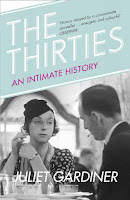 Having found Juliet Gardiner's history of Wartime Britain hugely useful, I've been making my way through this even more enormous tome, in this case 763 pages before the acknowledgements. Annoyingly, my paperback edition does not include the extensive notes - these were originally included on the publisher's website, but that's long been consigned to history. The internet archive and me writing to the publisher all failed to turn up the notes, so I'll have to invest in a second-hand hardback. Arg.
Having found Juliet Gardiner's history of Wartime Britain hugely useful, I've been making my way through this even more enormous tome, in this case 763 pages before the acknowledgements. Annoyingly, my paperback edition does not include the extensive notes - these were originally included on the publisher's website, but that's long been consigned to history. The internet archive and me writing to the publisher all failed to turn up the notes, so I'll have to invest in a second-hand hardback. Arg.This annoyance aside, it's another excellent history bringing so much of the past to life. Inevitably, it's not quite as enthralling as the wartime volume, as it can't match that mix of horror, oddness and human interest. I've made numerous notes on stuff that illuminates the early life of David Whitaker for the book I'm writing at the moment. But all sorts of other stuff stands out: the vivid descriptions of the fire that destroyed the Crystal Palace, visible from all over London (from p. 473), or the shocking road-traffic statistics from 1934: 7,343 deaths and 231,603 injuries (p. 679).
March 30, 2023
Doctor Who Magazine #589
 The new issue of Doctor Who Magazine features interviews with the three directors of this year's forthcoming TV episodes, and has the results of the poll into the best First and Second Doctor adventures. The latter is the subject of my latest "Sufficient Data" infographic, illustrated as always by clever Ben Morris.
The new issue of Doctor Who Magazine features interviews with the three directors of this year's forthcoming TV episodes, and has the results of the poll into the best First and Second Doctor adventures. The latter is the subject of my latest "Sufficient Data" infographic, illustrated as always by clever Ben Morris.I also interviewed Moses Ogundeji, who explains what it means to be "best boy" on the new series recording at the moment.
March 22, 2023
Beautiful Shadow - A Life of Patricia Highsmith, by Andrew Wilson
 I said in reviewing Martin Edwards' The Life of Crime last month that Patricia Highsmith had been "smuggling her snails in her bra." Edwards was quoting Andrew Wilson's 2003 biography of Highsmith, which a kind friend then sent me.
I said in reviewing Martin Edwards' The Life of Crime last month that Patricia Highsmith had been "smuggling her snails in her bra." Edwards was quoting Andrew Wilson's 2003 biography of Highsmith, which a kind friend then sent me.It's a fascinating story of a fascinating life. Highsmith is a complex, contradictory subject - on several occasions we're given completely different accounts of her, by turns cruel or kind, quiet or outspoken, fearful or bold. There are lots of reasons not to like her - the racism, the snobbery, the meanness with money when she was so wealthy. Yet understanding her background, her relationship (or lack of it) with her mother and her various struggles and heartbreaks makes this a compelling read.
There are all kinds of odd, striking moments. As well as the snails, there's her short-lived relationship with Tabea Blumenschein,
"the 25 year-old star and producer of the lesbian avant-garde pirate adventure Madame X" (p. 366).
Highsmith and Blumenschein spent six days together in a flat in Pelham Crescent, South Kensington, in May 1978 and at one point browsed the record shops. Blumenschein told Wilson that,
"Pat bought me the Stiff Little Fingers record" (p. 367),
presumably the band's debut single "Suspect Device" (released 4 February that year), before they went to dine with Arthur Koestler. The incongruity of that is even more striking when compared to Highsmith's selection the following year for Desert Island Discs: Bach (twice), Mahler and Mozart, and George Shearing's "Lullaby of Birdland".
A number of things made me begin to suspect that Highsmith was neurodiverse, and late on in the book her friend and neighbour Vivien De Bernardi told Wilson,
"In hindsight, I think Pat could have had a form of high-functioning Asperger's Syndrome. She had a lot of typical traits. She had a terrible sense of direction ... She was hypersensitive to sound and had these communication difficulties. Most of us screen certain things, but she would spit out everything she thought. She was not aware of the nuances of conversation and she didn't realise when she had hurt other people," (p. 394).
De Bernardi said this explains why Highsmith's relationships did not last; I think that's a bit glib - and that Highsmith may also have had some kind of attachment disorder, not helped by her (lack of) relationship with her mother. But I'm struck by De Bernardi's perspective of how this neurodiversity impacted Highsmith the writer:
"Although she didn't really understand other people - she had such a strange interior world - she was a fantastic observer. She would see things that an average person would never experience," (ibid).
Wilson has much to say about the content of and responses to Highsmith's lesbian novel The Price of Salt (1952), later republished as Carol and adapted into the acclaimed film. Highsmith originally published the book under a pseudonym and even when it went out in her own name was guarded in interviews about her sexuality. Often, people who knew Highsmith speak of her attitude to women as if from an outside perspective - as if she were a man. Wilson quotes Highsmith's own cahiers (notebooks) at great length, including a passage from 1942 that is ostensibly about other women and yet surely about herself.
"The Lesbian, the classic Lesbian, never seeks her equal. She is ... the soi-disant [self-styled] male, who does not expect his match in his mate, who would rather use her as the base-on-the-earth which he can never be," (p. 48, quoting Highsmith's Cahier 8, 11/18/42, Swiss Literary Archives in Berne).
Repeatedly, Highsmith identified with her most famous fictional creation Tom Ripley, signing a copy of Ripley Under Ground for her friend Charles Latimer as "from Tom (Pat)," (p. 194, but see pp. 194-6, 199, 350 and 454 for further examples). I now want to reread The Talented Mr Ripley (1955) with all this stuff in mind - from a queer (in the sense of both "strange" and "homosexual"), autistic, trans perspective. It's a book about somebody wanting to be and transforming themselves into someone else; an act of disguise that I think, having read this biography, might be very revealing.
March 15, 2023
Doctor Who Magazine special: Showrunners
 The new special edition of the official Doctor Who Magazine is devoted to showrunners and producing the series from 1963 to now. I interviewed Julie Gardiner, executive producer of the series from when it returned to TV in 2005 until 2010, and then again for the episodes that will be broadcast later this year. What a thrill!
The new special edition of the official Doctor Who Magazine is devoted to showrunners and producing the series from 1963 to now. I interviewed Julie Gardiner, executive producer of the series from when it returned to TV in 2005 until 2010, and then again for the episodes that will be broadcast later this year. What a thrill!
March 12, 2023
In conversation with Fatima Manji - video
You can now watch the video of my interview with Fatima Manji about her book Hidden Heritage, conducted yesterday as part of Macfest.
It's a fascinating book. Among the many stories told, I was much taken by the fact that Abdul Karim, known as the "Munshi", taught Queen Victoria,
"to speak and write in what was then known to Britons as 'Hindustani'; essentially the Hindi and Urdu languages. She learned the Nastaliq writing system of Urdu which itself derives from Persian." (p. 137)In 1902, her son the Duke of Connaught spoke Urdu when he welcomed dignitaries from India and elsewhere to commemorations relating to the coronation of his brother, Edward VI. As I say in the interview, my grandfather also had to learn Urdu while serving in the British Army in India in the 1930s - he apparently had three months to learn it before undergoing an exam with an Indian examiner; if he failed, he got sent home. Grandpa was then encouraged to learn a second Indian language and learned Pashto, which was of use in his time in the North West Frontier. He was still reasonably fluent in the early 1990s.
But as Manji argues,
"Victoria's enthusiasm for Urdu, her passion for art and culture of the Orient, and her defence of her friend Abdul Karim are admirable. They are under-reported inspirations in Britain's history for us to draw upon. Yet they cannot whitewash her presiding over a repressive, destructive colonial empire. Ultimately it is the structural, and not the personal, that determined the fate of the millions she ruled." (p. 151)I'm also struck by the story of two Indian brothers fighting on opposing sides in the First World War: Mir Dast was awarded the Victoria Cross by the British; Mir Mast was awarded the Iron Cross by the Germans. Oh, and Manji also speaks to my friend Vinay Patel about his 2018 Doctor Who episode Demons of the Punjab (p. 111).
March 2, 2023
Doctor Who Magazine #588
 The new issue of Doctor Who Magazine boasts a 28-page retrospective on
The Sarah Jane Adventures
which are now back up on the BBC's iPlayer.
The new issue of Doctor Who Magazine boasts a 28-page retrospective on
The Sarah Jane Adventures
which are now back up on the BBC's iPlayer. The 'Sufficient Data' infographic I've written, illustrated by clever Ben Morris, looks at what Sarah endured in her time travelling with the Doctor. "I must be mad," I thought as I tried to work out if Skaro and Voga qualify as cold and/or wet.
Simon Guerrier's Blog
- Simon Guerrier's profile
- 60 followers



